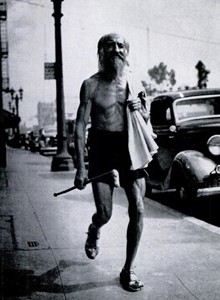 For reasons too drab to mention, we recently stumbled across this sordid 1982 tale about a self-described “mountain man” who turned murderous. We were struck not so much by the brutality of Henry Burton Merrill’s crimes, but rather by the media’s insistence on referring to him as a “hermit.” And that got us thinking, naturally, about the American tradition of eremitism, and how it has come to take on very different dimensions than back in the days of Walden Pond.
For reasons too drab to mention, we recently stumbled across this sordid 1982 tale about a self-described “mountain man” who turned murderous. We were struck not so much by the brutality of Henry Burton Merrill’s crimes, but rather by the media’s insistence on referring to him as a “hermit.” And that got us thinking, naturally, about the American tradition of eremitism, and how it has come to take on very different dimensions than back in the days of Walden Pond.
When we usually think of hermits, we think of bearded men living alone in the wilderness. And for most of America’s lifespan, that stereotype has certainly held true. But with the rise of the city came an attendant rise in a very different sort of hermit—a character more akin to the holy fools of bygone Christianity. These men—and, yes, we’re largely talking blokes here—were able to create mental isolation amidst the bustle of urban landscapes, in large part by making it very clear they refused to abide by society’s strictures.
Our favorite early example of this phenomenon comes from our blessed hometown of Los Angeles, California, where all manner of urban hermits flourished during the 1930s. Perhaps the most celebrated of these chaps was one Harry Hermann, aka “Herman the Hermit,” who is pictured above in his natural habitat: walking semi-nude down Hollywood Boulevard. Like many of his fellow ascetics, Herman came to his oddball habits late in life, to the great chagrin of his poor wife:
Harry Hermann, 79-year-old “Hermit of Hollywood,” was divorced today because he refused to wear pants.
“When we were married in 1920,” Mrs. Pearl Hermann told the court, “he wore pants just like any other men. Now he goes around nude and wants me to do the same.”
Hermann brought almost nude guests to their tin and tarpaper home in the Hollywood hills, Mrs. Hermann said.
So great was Herman’s fame that he was eventually featured in a 1938 Life spread entitled “Cuckooland,” about the weirdos who inhabited Southern California. (We recommend flipping a few pages forward to check out the tale of the massive Estes clan.)
Herman was apparently not a man of letters, so we cannot know whether his hermit-in-the-big-city routine brought him true happiness. But we do hope he appreciated the namecheck he eventually received on Deputy Dawg.


jackal // Jan 12, 2010 at 6:36 pm
They’ve still got nothing on Indian sadhus. Did mothers warn their children to stay away from them?
Hm, actually, probably yes..
Brendan I. Koerner // Jan 13, 2010 at 10:46 am
@jackal: We actually namechecked sadhu asceticism back in December, when we posted a loving obit for Barrel Man:
https://microkhan.com/2009/12/09/r-i-p-barrel-man/
The one sadhu practice that has always struck us as truly astonishing is the whole standing-on-one-leg-for-years deal. I would, indeed, probably warn my son away from hanging around such a character, just in case he wished to pursue the endeavor himself.
Christopher // Feb 25, 2010 at 12:41 am
Is it known if Henry Burton Merrill is still alive? He was friends with my grandfather, who was living with him, when he was charged for those slayings found in the well near his residence.
Stephen // Jul 18, 2010 at 7:16 am
Burton Merrill died on November 24, 2006. Is it known if all those bodies in the well were identified? I’m investigating the 1975 murder of Durwood Grisham and the disappearance of George White (who was last seen with Grisham). Grisham’s body was found but White’s was not. I believe Merrill to be involved.
Brendan I. Koerner // Jul 21, 2010 at 11:51 am
@Stephen: Sorry, I don’t have any additional info on that case. But you should try contacting the Hill County district attorney, Dan Dent. He worked that case in 1982, and is still going strong:
http://www.co.hill.tx.us/ips/cms/districtcourt/districtAttorney.html
Stephen // Jul 29, 2010 at 2:48 pm
Thank you Brendan! I will contact him right away. I really appreciate it!
Ryan Prigmore // Aug 29, 2014 at 6:17 am
Burton was an uncle of mine. His brother, Bill, was my father’s brother-in-law, and raised him on the banks of the Brazos river. Never got to meet Burt, but I was very fond of Bill as a child. There’s actually a song written about Burt that I feel exonerated Burt, and why he did what he did. Looking forward to a reply.